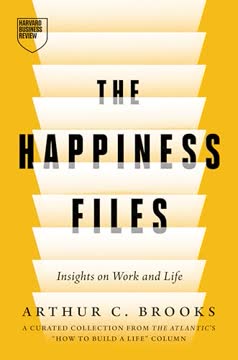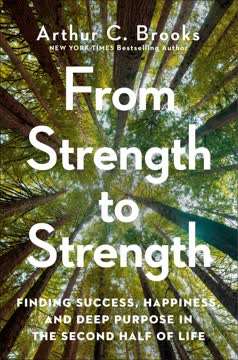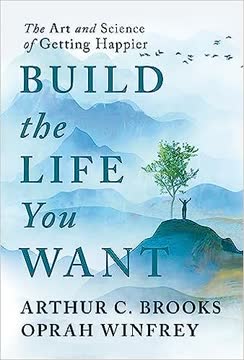Key Takeaways
1. Life as a Start-up: Prioritize Happiness, Not Just Worldly Rewards
Your life is the most important management task you will ever undertake.
Treat life entrepreneurially. View your life as a start-up where you are the founder, entrepreneur, and CEO. This perspective encourages proactive self-management, risk-taking, and a focus on significant returns. Just as a successful business entrepreneur learns from setbacks, a "life entrepreneur" can transform challenges into opportunities for growth and greater fulfillment.
Redefine your rewards. Mother Nature hardwires us to chase worldly resources like money, power, pleasure, fame, and prestige for survival and gene propagation. However, research consistently shows that beyond basic needs, these external rewards do not buy happiness and can even harm personal relationships and a sense of meaning. The true "denomination of rewards" for a happy life is happiness itself, focusing on love, enjoyment, satisfaction, and meaning.
Live intentionally. Since natural urges often distract us from what truly brings happiness, it's crucial to live "fully awake." This means being alert to common cognitive errors and actively working to align your life with your intentional desires, rather than simply reacting to how you feel. By consciously managing yourself, your career, relationships, and goals, you can build a life rich in genuine well-being.
2. Master Self-Management: Transform Failures and Time-Wasters into Growth
To find strategies to overcome the worst suffering after failure, I consulted Xiaodong D. Lin, a professor of cognitive studies at Columbia University.
Embrace failure as a teacher. When you've given your best and still failed, the pain can be intense and lead to rumination, imagining a cascade of ruin. However, this emotional suffering, once a survival mechanism, is maladaptive in modern life. Instead of brooding, actively manage the pain by viewing failure as a powerful force for improvement. Studies show that learning about others' failures or creating a "CV of failures" can motivate better handling of defeats and lead to higher performance.
Stop wasting precious time. Many of us fritter away huge portions of our lives on activities that feel good momentarily but bring anxiety and regret later, like excessive screen time. This happens because our impulsive "toddler brain" overestimates short-term pleasure and underestimates long-term well-being. Time is your most precious, limited resource, and wasting it on things you genuinely dislike or that crowd out more valuable pursuits is a significant source of unhappiness.
Procrastinate strategically. While chronic procrastination on necessary tasks is detrimental, a little strategic delay can be beneficial for creative work. Instead of rushing to get things off your plate ("pre-crastination"), allow ideas to ferment. For example, jot down an idea, sleep on it, and then start writing. This "prudent" procrastination, coupled with mindfulness and avoiding mindless distractions like doomscrolling, can lead to more innovative solutions and better work quality.
3. Cultivate Self-Control and Boundaries for Lasting Well-being
If authenticity leads to acting out, it won’t bring you happiness.
Reclaim self-control. In an "Age of Authenticity" that often encourages uninhibited self-expression, paradoxically, happiness levels have fallen while depression and anxiety have surged. While repression is unhealthy, a complete lack of self-control is linked to irresponsible behaviors like criminal offending, binge drinking, and public profanity, which harm both individual and collective well-being. Increasing self-control, rather than lowering it, is a proven strategy to raise personal happiness.
Set clear work-life boundaries. Burnout, characterized by emotional exhaustion, cynicism, and a negative view of personal effectiveness, is rampant, especially in meeting-heavy and remote-work environments. The key to breaking this cycle is creating "space" between your life and your job. This means:
- Setting defined hours for work and not checking emails outside them.
- Using a personal phone to leave work devices behind.
- Making rules with loved ones not to discuss work during certain times.
These "little sabbaths" refresh and renew engagement, often improving productivity.
Address deeper money worries. While money is crucial for meeting basic needs, anxiety about it often masks deeper concerns once those needs are met. Basing self-worth on financial success ("financial contingency of self-worth") leads to loneliness and social disconnection. To combat this:
- Give money away to demonstrate that you are not your money.
- Work less and redirect time to non-remunerative activities like reading, nature, meditation, or volunteering.
These actions help you become "rich in what really matters," fostering self-actualization and transcendence.
4. Navigate Career Changes with Intuition and Realistic Expectations
To find the job that gives you the best chance of loving your work, you need to be attentive to your own gut sense.
Manage job change expectations. While changing jobs often brings an initial surge in satisfaction, this "honeymoon period" can wear off within months, especially for those with a self-centered career orientation. Be realistic: a new job will likely improve things but won't be a magical cure-all. Happiness outside of work is the biggest predictor of work happiness, so cultivate well-being in your personal life first, rather than making your job a "kind of religion."
Trust your gut for complex decisions. When faced with multiple professional opportunities, your intuition can be a powerful guide. Research shows that for complex decisions, feeling-based choices are more likely to lead to optimal outcomes than purely analytical ones. Pay attention to three key feelings:
- Excitement: A sense of prospective happiness and joy about a better future.
- Fear (danger vs. dread): A positive "danger" fear indicates a difficult but doable challenge; "dread" signals something entirely negative and should be avoided.
- Deadness/Emptiness: A feeling of boredom, loneliness, or hopelessness, which is a strong indicator to steer clear.
Embrace midlife as an opportunity. The "midlife crisis" is not an inevitable fate. Instead, midlife can be an opportunity for "transcendence" by making two crucial choices. First, focus on what age gives you, like crystallized intelligence (seeing patterns, teaching, explaining complex ideas), rather than what it takes away. Second, choose "subtraction, not addition." Early life is about filling a canvas; midlife is about sculpting by chipping away responsibilities to make time for thinking, reading, loving, and praying.
5. Deepen Connections: Communicate with Empathy and Give Generously
The quality of our relationships, in fact, depends on the ratio of praise to criticism that is exchanged.
Give criticism as a gift, not a weapon. Criticism is hard to accept because our brains process it as a social threat. To make it constructive, depersonalize it by focusing on the issue, not the person. When giving criticism, ensure it's intended to help, delivered respectfully, offers a path to improvement, and targets the recipient's needs. Remember the "Praise in public, criticize in private" rule, as public praise is more motivating, and private criticism is more effective.
Master the art of the compliment. High-performing teams and happy couples maintain a "magic ratio" of positive to negative interactions (around 5:1). Effective compliments must be:
- Honest: Credible and sincere, not perceived as dishonest flattery.
- A pure gift: Given with no expectation of reciprocation.
- Unqualified: Avoid comparisons that can backfire or make the recipient uncomfortable.
Beyond appearance or performance, actively recognize and compliment "moral beauty"—acts of charity, kindness, compassion, or courage—to uplift both the giver and receiver.
Influence with love, not anger. When disagreements arise, our instinct might be to lash out, using our values as a weapon. However, this only hardens opposing views (the "boomerang effect"). To persuade and build relationships, offer your values as a gift. Focus on shared agreements, listen sincerely to understand others' perspectives, and refuse to be conscripted into "Outrage Industrial Complexes" that profit from division. Speaking "the truth in love" fosters connection and genuine influence.
6. Optimize Interactions: Minimize Virtual Meetings, Maximize Real Human Connection
Virtual interaction is a simulation of real human life.
Meetings are often miserable. Work meetings are a significant source of unhappiness and lost productivity, costing billions annually. They increase fatigue, workload perception, and force "surface acting" (faking emotions). To combat this:
- Ruthlessly avoid and cancel unnecessary meetings.
- Create meeting-free days to boost productivity and reduce stress.
- Keep necessary meetings short (30 minutes or less) and focused.
- Invite only the minimum number of people required, as group size often reduces individual effort and accountability.
Beware the perils of "Zoom fatigue." While videoconferencing was essential during the pandemic, it comes with significant costs. "Zoom fatigue" stems from factors like asynchronicity, lack of body language, increased self-awareness (seeing yourself), and multitasking opportunities. It drains mental energy, mutes empathy, and can lead to lower performance, suppressed creativity, and even depression and anxiety. Virtual interaction is like "junk food"—filling and convenient, but no substitute for a healthy diet of in-person connection.
Prioritize in-person interaction. For happiness and productivity, in-person interactions are superior to virtual ones. Practice "good Zoom hygiene" by setting boundaries: turn off cameras when possible, use old-fashioned phone calls, and enforce strict end times for virtual meetings. Crucially, program in regular time with "real live humans." The goal is to treat virtual interaction as a tool, not a primary mode of social sustenance, preserving the authenticity and depth of human connection.
7. Build a Fulfilling Life: Embrace Jung's Pillars and Love's Entrepreneurial Journey
"Good relationships keep us healthier and happier. Period."
Embrace Jung's five pillars for "happierness." Carl Jung, a happiness skeptic in some ways, outlined a strategy for lifelong progress toward well-being, or "happierness." These pillars, supported by modern research, include:
- Good physical and mental health: Essential for lowering unhappiness and managing stress.
- Good personal and intimate relations: Close relationships, especially marriage, family, and friendships, are the heart of well-being.
- Seeing beauty in art and nature: Engagement with nature's beauty consistently enhances well-being; art's effect depends on the mood it evokes.
- A reasonable standard of living and satisfactory work: Work protects mental health, and meaningful work (earned success, service to others) boosts happiness.
- A philosophical or religious outlook: Provides resilience, meaning, and perspective on suffering.
Parent with love and action. While genetics play a significant role in a child's personality, parental warmth and affection are crucial for their happiness and psychological adjustment. Your actions speak louder than words; be the person you want your children to become. Don't despair over past mistakes or your own imperfections; unconditional love and setting a good example are the most powerful tools.
Learn from romantic failures. Like business start-ups, romantic ventures often involve early failures. Instead of getting stuck in a "doom loop" of repeated mistakes, treat breakups as learning opportunities. Analyze past relationships forensically to understand errors in social cognitive maturity, romantic agency, or coherence. Don't give up on love; each learned lesson improves the odds of building the "dream romance" you desire.
8. Redefine Success: Pursue Progress and Purpose, Not Just Accolades
Achieving a goal and achieving happiness are entirely different.
Success doesn't guarantee happiness. Many ambitious people mistakenly assume that achieving success (money, recognition) will automatically lead to happiness. However, research shows that large pay increases have only a small, transitory effect on well-being, and career success can indirectly chip away at life satisfaction through stress and strained relationships. The correlation between success and happiness is often reversed: happier people tend to be more successful.
Prioritize progress over attainment. Humans are wired for improvement, not just arrival. The "post-achievement hangover" and feelings of emptiness after reaching a major goal are common because dopamine, which fuels pleasurable anticipation, depletes afterward. Instead of single-mindedly chasing an end state, focus on enjoying the journey and the daily progress. Break long-term goals into smaller, achievable chunks to experience frequent, small victories that sustain happiness.
Discard trophies, embrace the present. Trophies and mementos of past glories can become "invidious intertemporal autocomparisons," mocking you when current circumstances are challenging. Instead of fetishizing past achievements, commemorate what truly matters: moments of intrinsic satisfaction and strong relationships. Get the time frame right by celebrating daily wins and living in the present, rather than letting past triumphs overshadow current joy.
Use intelligence and risk for good. Intelligence, like money or power, can be a source of happiness if used to serve others, not for personal gain or tearing down. Give your ideas away freely and use your mental dexterity to lift people up. Similarly, purposeful risk-taking (bravery), like learning a new skill or making a significant life change, can enhance courage and happiness by pushing you out of your comfort zone. Avoid recklessness, but embrace challenges that make you feel more alive and proud.
Last updated:
FAQ
What’s The Happiness Files: Insights on Work and Life by Arthur C. Brooks about?
- Science of Happiness at Work and Life: The book explores the science behind happiness, blending behavioral science, neuroscience, psychology, and practical advice to help readers manage their lives as if they were managing a start-up.
- Comprehensive Life Management: Brooks frames life as the most important management task, encouraging readers to approach their personal and professional lives with intentionality, risk management, and a focus on meaningful rewards.
- Practical Essays: The book is structured as a collection of essays originally published in The Atlantic, organized into five parts: managing yourself, building your career, communicating with others, balancing work and life, and defining success.
- Evidence-Based and Actionable: Each essay combines research findings with actionable steps, aiming to help readers understand happiness intellectually and apply it practically.
Why should I read The Happiness Files by Arthur C. Brooks?
- Expert Author: Arthur C. Brooks is a leading happiness researcher and Harvard professor, offering credible, research-backed insights.
- Applicable to Modern Life: The book addresses common challenges like burnout, work-life balance, money worries, and the pursuit of success, making it highly relevant for professionals and anyone seeking greater well-being.
- Actionable Advice: Each chapter provides not just theory but also practical steps and tools that readers can implement immediately.
- Holistic Approach: The book covers happiness from multiple angles—self-management, career, relationships, and personal values—offering a well-rounded guide to living better.
What are the key takeaways from The Happiness Files by Arthur C. Brooks?
- Progress Over Perfection: True happiness comes from making progress toward meaningful goals, not from achieving specific milestones or accumulating wealth, power, or prestige.
- Self-Management is Foundational: Managing your own habits, boundaries, and emotional responses is crucial for both personal and professional happiness.
- Relationships Matter Most: Deep, authentic connections with family, friends, and colleagues are the strongest predictors of well-being.
- Redefine Success: Success should be measured by happiness, love, enjoyment, satisfaction, and meaning, rather than external achievements or material rewards.
How does Arthur C. Brooks define happiness in The Happiness Files?
- Happiness as a Reward: Brooks defines happiness as the ultimate reward in life, focusing on love, enjoyment, satisfaction, and meaning rather than material gains.
- Not Just Positive Emotions: Happiness is not a constant state of bliss but involves progress, resilience, and the ability to manage negative emotions.
- Science-Based Definition: The book draws on decades of research showing that happiness is best pursued through intentional living, strong relationships, and purposeful work.
- Personal Responsibility: Brooks emphasizes that happiness is our own responsibility, not something guaranteed by nature or external circumstances.
What are the main concepts and methods in The Happiness Files by Arthur C. Brooks?
- Start-Up Life Approach: Treat your life as a start-up, where you are the founder and manager, responsible for taking risks and seeking meaningful rewards.
- Progress Principle: Focus on making tangible progress rather than fixating on end goals or achievements.
- CV of Failures: Keep a written record of failures and lessons learned to normalize setbacks and foster growth.
- Practical Application: Each essay includes both scientific background and actionable steps, such as time-blocking, saying “no,” and practicing gratitude.
How does The Happiness Files by Arthur C. Brooks address failure and resilience?
- Failure as Growth: Brooks encourages reframing failure as an opportunity for learning and personal development, not as a reflection of self-worth.
- CV of Failures: He suggests maintaining a written list of failures and the lessons learned from them, which helps process setbacks constructively.
- Focus on Ideals: Keeping core values front and center helps individuals move past failure and maintain motivation.
- Avoid Rumination: The book warns against excessive rumination, which can lead to avoidance and missed opportunities, and instead promotes active management of emotional responses.
What advice does The Happiness Files give about work-life balance and burnout?
- Set Boundaries: Brooks advocates for clear boundaries between work and personal life, such as defined work hours and device-free times.
- Schedule Downtime: He recommends time-blocking not just for work but also for leisure and rest, to prevent burnout and maintain productivity.
- Prioritize Relationships: The book emphasizes that the strength of intimate ties—family and friends—provides the greatest returns on life.
- Benedictine Wisdom: Drawing from monastic traditions, Brooks suggests limiting work hours and accepting that not everything will get done, prioritizing restoration and well-being.
How does The Happiness Files by Arthur C. Brooks approach money and happiness?
- Money’s Limited Role: The book explains that money increases happiness only up to the point where basic needs are met; beyond that, its impact plateaus or can even decrease well-being.
- Financial Contingency of Self-Worth: Brooks warns against tying self-esteem to financial success, as this leads to anxiety and social disconnection.
- Spend on Experiences and Giving: He advises using extra income for experiences with loved ones, buying time, and charitable giving, all of which are shown to boost happiness.
- Address Deeper Worries: Persistent money worries often mask deeper issues related to self-worth or values, which should be addressed directly.
What does The Happiness Files say about relationships, communication, and social connection?
- Quality Over Quantity: Deep, meaningful relationships are more important for happiness than the number of connections.
- Giving and Receiving Feedback: The book provides research-backed strategies for giving and receiving criticism and compliments effectively, emphasizing honesty, respect, and private delivery of negative feedback.
- Combatting Loneliness: Brooks highlights the importance of socializing outside of work and investing in friendships to combat loneliness and isolation.
- Navigating Frenemies: He offers tools for identifying and distancing oneself from toxic relationships, while also encouraging self-reflection on one’s own role in friendships.
How does The Happiness Files by Arthur C. Brooks redefine success and achievement?
- Progress Over Achievement: Success is redefined as ongoing progress and personal growth, not the attainment of specific goals or accumulation of trophies.
- Beware the Arrival Fallacy: Brooks warns that achieving major goals often leads to emptiness or a “post-achievement hangover,” rather than lasting happiness.
- Let Go of Past Glories: He suggests discarding physical trophies and focusing on present joys and relationships, rather than clinging to past achievements.
- Pursue Happiness First: The book argues that happiness leads to success, not the other way around, and that meaningful work and service to others are key components.
What are some unique or surprising concepts in The Happiness Files by Arthur C. Brooks?
- CV of Failures: Keeping a written record of failures as a tool for growth and resilience.
- Mindful Cursing: Swearing, when done intentionally and sparingly, can provide emotional relief and even honesty, but should be used with care.
- No Club: Forming a group to practice saying “no” to unnecessary commitments, increasing time and focus for what matters.
- Rhumb Line Goals: Treating professional goals as navigational guides rather than fixed destinations, allowing for flexibility and adaptation.
What are the best quotes from The Happiness Files by Arthur C. Brooks and what do they mean?
- “Your life is the most important management task you will ever undertake.”
- This quote encapsulates the book’s central message: approach your life with the same intentionality and strategy as a successful entrepreneur.
- “Progress, not meeting a goal, is what brings true happiness.”
- Brooks emphasizes that ongoing improvement and movement toward meaningful objectives are more satisfying than achieving any single milestone.
- “Mother Nature doesn’t care about our happiness; that’s our responsibility.”
- The author reminds readers that happiness is not a given but something we must actively pursue and manage.
- “If you truly want to master these ideas—or any ideas, for that matter—you need to share them.”
- Teaching and sharing happiness strategies with others not only reinforces your own learning but also spreads well-being more broadly.
Review Summary
The Happiness Files receives mostly positive reviews, with readers appreciating Brooks' insights on happiness in various life aspects. Many find the advice practical and well-researched, though some note familiarity with the content from his previous works. The book's structure, based on Brooks' Atlantic columns, makes for easy reading. Reviewers highlight the sections on career and work as particularly strong. Some readers suggest it's an excellent introduction to Brooks' ideas, while others prefer his other books.
Similar Books



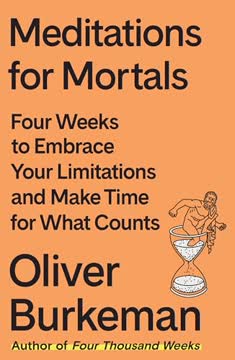
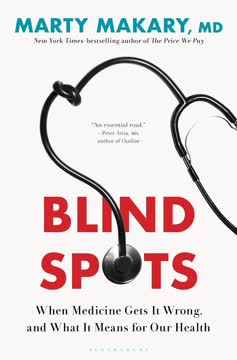
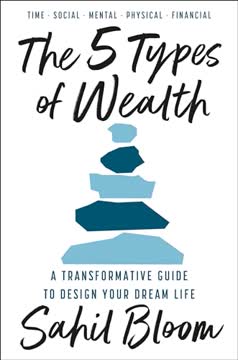
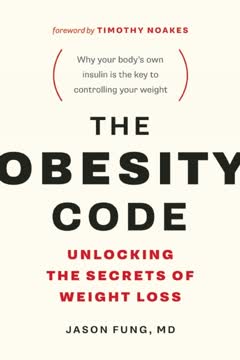

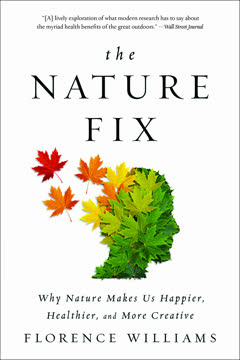

Download PDF
Download EPUB
.epub digital book format is ideal for reading ebooks on phones, tablets, and e-readers.
